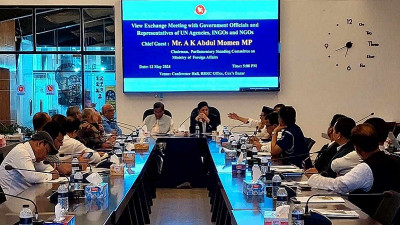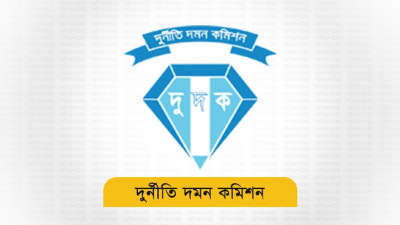 Bonik Barta photo
Bonik Barta photo Haresa Begum, a villager from Cox’s Bazar’s Ramu upazila,
started rearing goats as a hobby. But, gradually she started a farm, which has
now 40 goats. As there is no male goat in her farm, she has to take her she-goats
to a village 15-20 kilometers away for breeding. It costs her Tk 1,000 to 1,500
per goat. Due to these problems, mating time of half of the goats expires. And,
the quality of the available he- goats is not that good. Owing to multiple
cross breeding, it is difficult to say what variety her goats actually belong
to. To make the matter even worse, her goats now suffer from more diseases than
before.
Haresa Begum is not alone. Goat farmers in every district are
facing this crisis. Speaking to quite a few of them, it has been learnt that
dearth of he-goats is the most formidable challenge the farmers are facing. Farmers
do not want to rear he-goats mainly due to misconception. And, owing to
increased demand, male goats are castrated few days after birth. Some rear
he-goats overcoming social taboo, but their quality is not that good. Despite
that farmers bring their goats for mating with these he-goats.
In many countries across the world, artificial insemination is
used in goat farming. But, it does not exist in Bangladesh at the government
level. Private businesses are not that much interested as it is not profitable.
Experts believe that a long-term crisis on goat production is in the making due
to these problems.
“There is no initiative in the country to produce high quality
male goats with enhanced capacity. This is the biggest problem with respect to
goat production. The variety of male goats needs to be developed every year,” Professor
Dr AK Fazlul Haque Bhuiyan of Genetics and Animal Breeding Department at
Bangladesh Agriculture University (BAU), told Bonik Barta.
But, he said, “There are no government or private initiatives
in this regard.”
Dr Haque also said that due to increased inbreeding, the
quality of a variant gets inferior and meat production goes down.
According to Department of Livestock Services, there were 25.4
million goats in the country 10 years ago. The figure currently stands at 27
million. There are 5,479 registered goat firms in the country and in nearly all
of them breeding takes place fully naturally.
Black Bengal is the most popular goat variety in the country. It
was given GI (Geographical Indication) recognition this year. There are some other
varieties too. Only, the breeding of Black Bengal is institutionally recognized
by the Livestock Rules, 2007.
The government has goat development farms in seven districts –
Dhaka, Chuadanga, Rajshahi, Jhenaidah, Sylhet, Chittagong and Barisal. However,
these farms cannot play a major role in developing goat varieties.
Currently, Department of Livestock Services, Bangladesh
Livestock Research Institute and private entity BRAC are working on artificial
insemination of goats. But, it is not yet available to the farmers. There is a
little semen production at private level. Since it is not profitable,
production is negligible. In general, a national committee provides approval
for any new variety and it only approves the semen production for Black Bengal
goats.
People concerned say that in order to overcome the crisis on
he-goats and to stop inbreeding, semen production will have to start at
government level. Of course, the Department of Livestock Services has
undertaken a project on artificial insemination of Black Bengal goats and development
of variants. This has not yet been approved by the Planning Commission. Under
the project, the department wants to collect he-goats from across the country
and work on the development of different varieties.
Farmers say that owing to the dearth of male goats, half of
the goats cannot mate. Mamunur Rashid from Hatiya upazila of Noakhali district
rears goats and sheep alongside cows and buffaloes. There are over 100 goats in
his farm. The she-goats need to be taken far for mating. “Cows and buffaloes
can be inseminated artificially, but it is not possible in cases of goats. Most
of the it is seen that goats cannot mate at the right time, but it is not
possible due to lack of he-goats,” Mamun told Bonik Barta.
BRAC is only entity that produces goat semen. The organization
has been inseminating goats artificially since 2000. It produces 70,000-80,000 doses
every year. According to people concerned, artificial insemination in case of
cow is profitable, but not in case of goats. As a result, concerned workers are
less interested.
BRAC Artificial Insemination Enterprise Deputy General Manager
Farukul Islam told Bonik Barta, “BRAC is a non-profit entity. We are working on
artificial insemination of Black Goat and development of varieties. We are
reaching people. If the government initiates programs for artificial
insemination and development, it will be very affective.”
Women are the principal driving force of the country’s
livestock sector. Especially, this sector is advancing riding on the labor of
women. According to a World Bank report, the participation of women is whopping
88.2 percent against 11.8 percent male. Most of the women rear goats on a small
scale. But, many are shutting down their farms due to lack of he-goats.
“I used to rear few goats. But, male goats are not able at
right time and it costs a lot to take the goats elsewhere. The quality of kids
is also not so good. That’s why, I sold the goats one by one,” said Rumana
Akter from Sonaimuri upazila of Noakhali district while talking to Bonik Barta.
Sylhet division is also hard hit by the crisis of male goats.
Amirun Nesa of Komolganj upazila of Moulvibazar district told Bonik Barta, “There
are no male goats in our village as well as adjoining ones. Farmers of this
area are solely dependent on male goats that are brought for Puja,” she told
Bonik Barta.
Department of Livestock Services implemented a project titled ‘Black
Bengal Goat Development and Extension’ from 2018 to 2022. Shariful Islam, the director
of the project and deputy director of Department of Livestock Services, told
Bonik Barta, “There is an acute crisis of he-goats in the country. What we are
providing from the government is inadequate. If we encourage rearing goats we
have to encourage rearing of male goats.”
“We have a project that is waiting to be approved. Under that
project Black Bengal goats will be developed and artificial insemination will
be done after collecting their semen,” he said.







